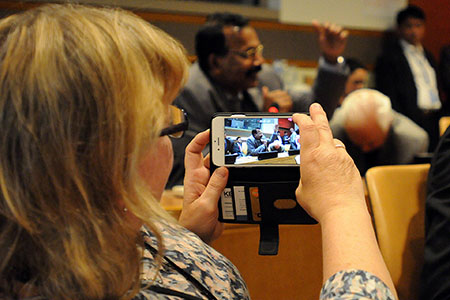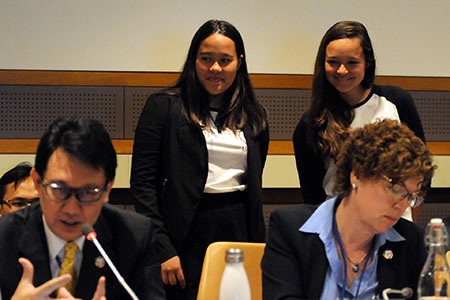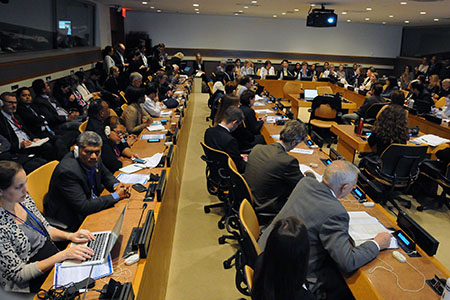Summary
The following side events were covered by ENBOTS on Tuesday, 6 June 2017:
- Oceans in the 2030 Agenda: The Role of Regional Governance - Advancing Regional Partnerships for SDG 14 Implementation
- Innovative and Sustainable Ocean Based Economy
- Swedish Initiatives for Agenda 2030
- Ocean’s 8: One Planet, One Ocean – Celebrating Global Cooperation On Ocean Science
- Environmentally Sound Waste Management as Action against Marine Litter
IISD Reporting Services, through its Earth Negotiations Bulletin on the Side (ENBOTS) Meeting Coverage, is providing daily web coverage of selected side events at the Ocean Conference.
Photos by IISD/ENBOTS | Francis DejonFor photo reprint permissions, please follow instructions at our Attribution Regulations for Meeting Photo Usage Page
Oceans in the 2030 Agenda: The Role of Regional Governance - Advancing Regional Partnerships for SDG 14 Implementation
Presented by the Federal Government of Germany, Government Offices of Sweden and UN Environment (UNEP)
Moderator Alexander Müller, Managing Director, TMG - ThinkTank for Sustainability, opened the session, underscoring that the implementation of SDG 14 cannot be done in isolation.
In opening remarks, Gunther Adler, State Secretary for the Environment, Nature Conservation, Building and Nuclear Safety, Germany, underscored the need to go further than reiterating existing commitments, including by undertaking ambitious, concrete actions. He highlighted the need for effective implementation structures for SDG 14 and greater focus on international ocean governance.
Karolina Skog, Minister for the Environment, Sweden, underlined the importance of cooperation between regional seas agreements and working together to implement measures, since those undertaken in one region are likely to affect other regions. She pointed to three key aspects for success: political commitment at the state level; science-based assessments and targets; and cooperation across sectors.
Erik Solheim, Executive Director, UN Environment (UNEP), gave examples from regional sea conventions in UNEP, stating the need to focus not just on solving problems but harnessing opportunities, including the oceans’ potential to provide food and a sustainable way of transporting goods.
Moving into the session on advancing regional partnerships for SDG 14 implementation, João Aguiar Machado, Director-General for Maritime Affairs and Fisheries, European Commission (EC), stressed the instrumental nature of regional cooperation, since “no-one alone can solve the problems affecting our oceans.” He outlined actions promoted by the EC to reinforce regional level cooperation, including the reform of the Common Fisheries Policy, which now takes a regionalized approach to management.
Didier Dogley, Minister of the Environment, Energy and Climate Change, Seychelles, and Chair of the Nairobi Convention, spoke on the need to take care of the “blue capital” provided by resources in the sea that many rely on for their livelihood. He stressed the importance of bringing together the plethora of organizations that exist to avoid segmentation of policies that are implemented by different groups.
Klaus Töpfer, Founding Director, TMG, said that the 2030 Agenda for Sustainable Development had put oceans at the center of sustainability. He called for a vision of “the kind of regional cooperation we want to see,” and to then develop a bottom-up approach for how to achieve that goal.
Meg Taylor, Secretary General, Pacific Islands Forum, underscored that an integrated approach for climate and ocean issues was needed, and hoped it would be recognized at the 23rd Conference of the Parties (COP 23) to the UN Framework Convention on Climate Change (UNFCCC), meeting under the Fijian Presidency in November 2017.
Árni Mathiesen, FAO, said “we are only currently touching the surface of harnessing the value of what we get from the sea, and that we need to move up the value scale by devising new uses for things we currently throw away.” He also underscored the need to develop better financing systems, underscoring the lack of resources for many regions.
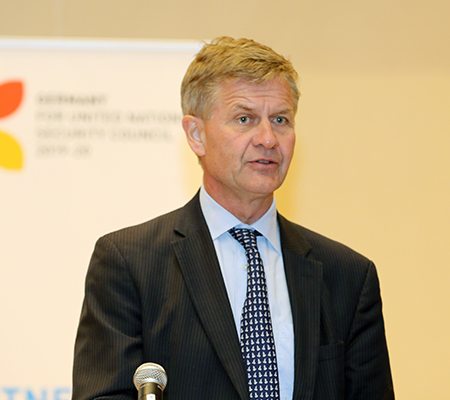
Erik Solheim, Executive Director, UN Environment (UNEP), said that “together we can solve all issues.”
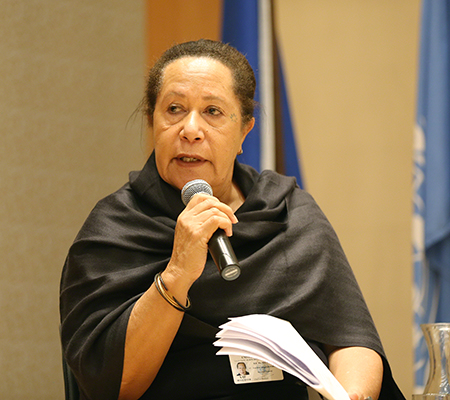
Meg Taylor, Secretary General, Pacific Islands Forum, said it was important that issues of partnership are looked at not only to implement SDG 14, but also SDG 17 to strengthen the means of implementation and revitalize the global partnership for sustainable development.
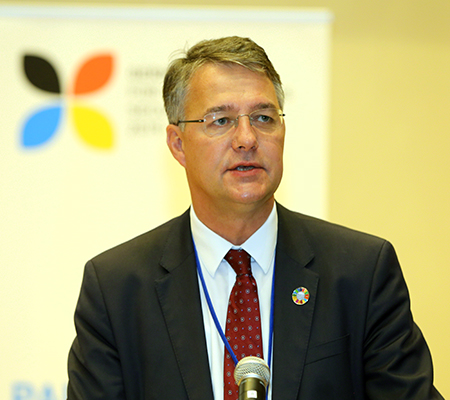
Gunther Adler, State Secretary for the Environment, Nature Conservation, Building and Nuclear Safety, Germany, said the international community was on the verge of squandering an opportunity since the Call for Action does not contain the ambitious, concrete commitments needed.
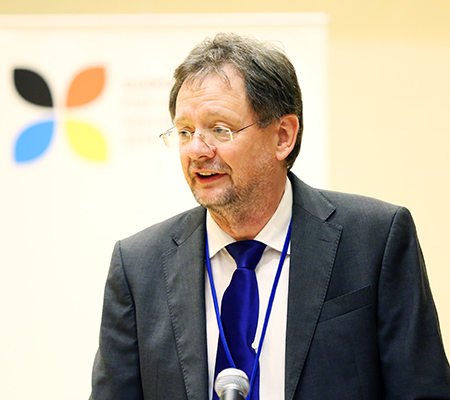
Moderator Alexander Müller, Managing Director, TMG, stressed linkages to other SDGs and the need for international mechanisms due to the many transboundary issues.

Panel (L-R):
Meg Taylor, Executive Secretary, Pacific Island Forum;
Árni Mathiesen, FAO;
Alexander Müller, Managing Director, TMG;
Klaus Töpfer, Founding Director, TMG;
João Aguiar Machado, Director-General for Maritime Affairs and Fisheries, EC; and
Didier Dogley, Minister of the Environment, Energy and Climate Change, Seychelles, and Chair of the Nairobi Convention.
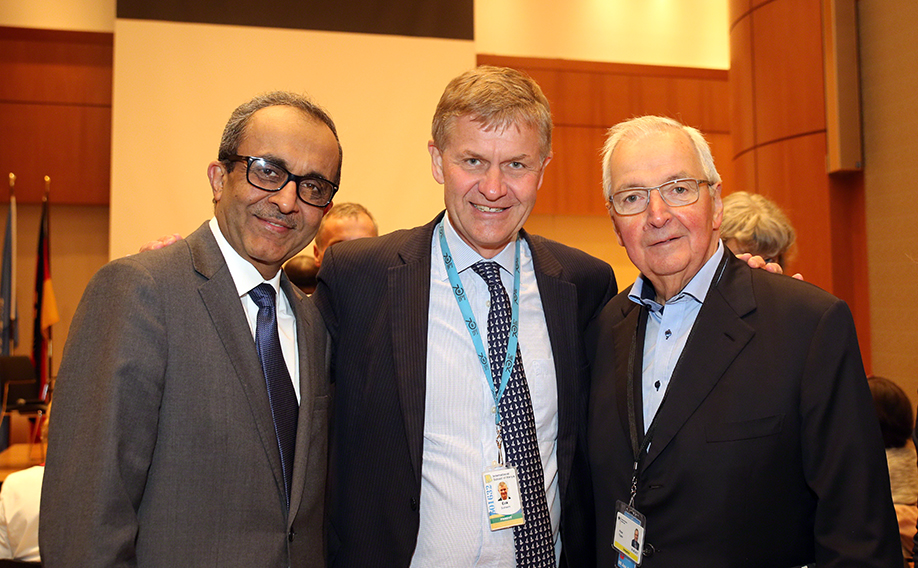
Jamil Ahmad, Deputy Director, UN Environment (UNEP); Erik Solheim, Executive Director, UNEP; Klaus Töpfer, Founding Director, TMG
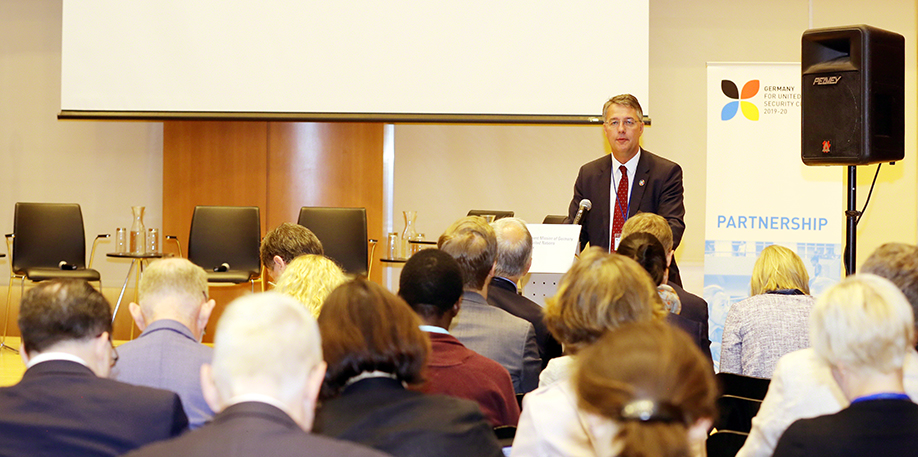
Gunther Adler, State Secretary for the Environment, Nature Conservation, Building and Nuclear Safety, Germany, delivered opening remarks at the event
Contacts:
- PERSON_NAME (Moderator Coordinator) | EMAIL_ADDRESS
- Malin Jörnehag (Coordinator) | malin.jornehag@regeringskansliet.se
- Helén Jannson (ZVT) | helen@zerovisiontool.com
- Erik Fridell (IVL Swedish Environmental Research Institute) | erik.fridell@ivl.se
- Sophie Carter (Swedish Steel Producers’ Association) | sophie.carter@jernkontoret.se
- http://www.zerovisiontool.com/event/agenda-2030-un-ocean-conference
- http://www.jernkontoret.se/sv/energi--miljo/vatten/havskonferens/?id=9501
- Julian Barbière (Intergovernmental Oceanographic Commission (IOC), UNESCO) | j.barbiere@unesco.org
- Clare Stark (Bureau of Strategic Planning (BSP), UNESCO) | c.stark@unesco.org
- Jenny Hedman (Swedish EPA) | jenny.hedman@naturvardsverket.se
More Information:
Innovative and Sustainable Ocean Based Economy
Presented by the Government Offices of Sweden and Organisation for Economic Co-operation and Development (OECD)
This event, moderated by Anna Petersson, Swedish Transport Agency, highlighted innovative sustainable technologies, and sustainable business and platform models for an ocean-based economy.
Sven-Erik Bucht, Minister for Rural Affairs, Sweden, discussed finding the necessary balance between economic growth and environmental protection in a sustainable ocean-based economy. He stressed the maritime role of Sweden and its innovation hubs around sustainability and circularity.
Douglas Frantz, Deputy Secretary-General, OECD, spoke about the urgent obligation to save the Ocean. He stressed the potential of the Ocean-based industry, from US$1.5-3 trillion by 2030 and over 40 million jobs, and the necessity to take actions considering the whole Ocean ecosystem.
Felismina Antia, National Director, Maritime and Fisheries Policy, Mozambique, spoke about the Northern Mozambique Channel (NMC) Partnership Initiative. She stressed the need to develop an integrated management of the NMC, based on a long-term vision and on regional collaboration. She highlighted four areas of focus: strengthening capacity for maritime spatial planning; sharing best practices in community-based marine resources management; promoting sustainable standards for the oil and gas industry; and empowering civil society.
Representing the shipping industry, Carl Carlsson, Zero Vision Tool (ZVT) Platform, spoke about the goals and achievements of the platform, which gathers 24 industry groups from Sweden and Finland towards a greener shipping sector. He underscored that the condition for this transition depends on the ability to create financial mechanisms to make it profitable.
Joel Oresten, Smögenlax Aquaculture, and Sofie Allert, Swedish Algae Factory, as part of Sotenäs Symbioscentrum, presented two projects on “industrial symbiosis,” based on the principles of a circular economy. Oresten presented an aquaculture project based on the recycling of fisheries’ waste. Allert presented her work to develop a high-value product derived from algae biomass.
In the ensuing discussion, panelists and participants considered the need to scale-up innovative projects and the legal constraints they often face.
Mattias Landgren, State Secretary to the Swedish Minister for Infrastructure, closed the session, underlining the importance of respecting international commitments and that the blue economy is good for business.
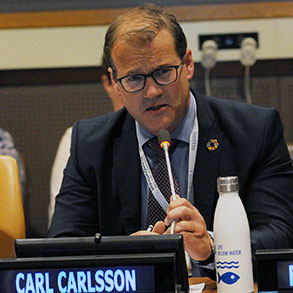
Carl Carlsson, ZVT, emphasized the need to create financing mechanisms for the shipping sector to make it sustainable and profitable.
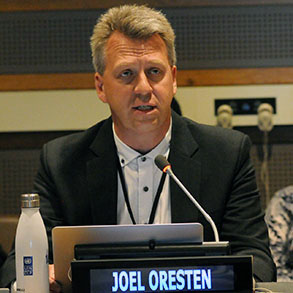
Joel Oresten, Smögenlax Aquaculture, presented his “fish flow model,” which supports salmon production using fisheries waste.
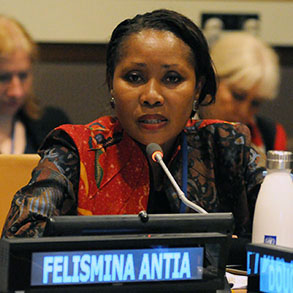
Felismina Antia, National Director for Maritime and Fisheries Policy, Mozambique, stressed the need for integrated ocean management of the Northern Mozambique Channel.

Panel (L-R):
Sofie Allert, Swedish Algae Factory;
Joel Oresten, Smögenlax Aquaculture;
Anna Petersson, Swedish Transport Agency;
Carl Carlsson, ZVT;
Felismina Antia, National Director, Maritime and Fisheries Policy, Mozambique;
Douglas Frantz, Deputy Secretary-General, OECD; and
Mattias Landgren, State Secretary to the Swedish Minister for Infrastructure.
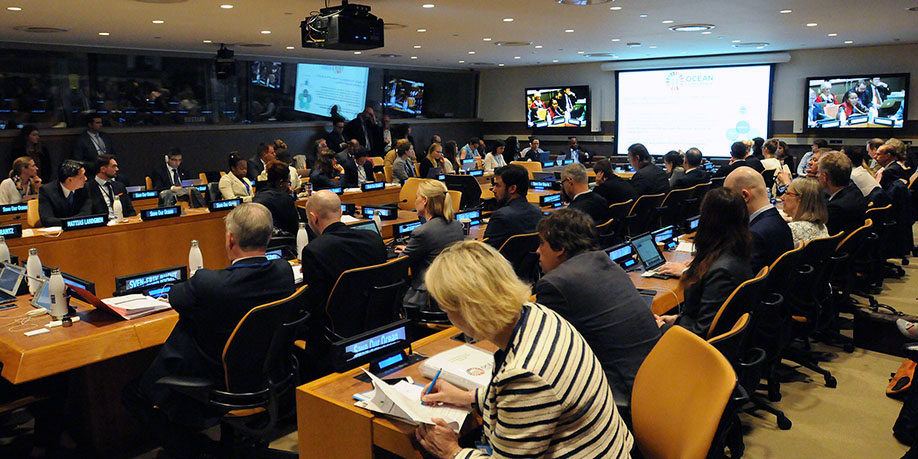
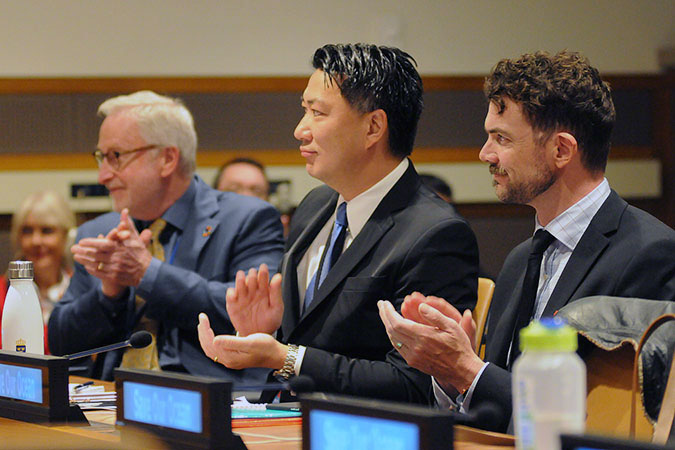
Contacts:
More Information:
Swedish Initiatives for Agenda 2030
Presented by the Confederation of Swedish Enterprise, Swedish Steel Producers’ Association, and Zero Vision Tool (ZVT), in cooperation with World Ocean Council (WOC), UN Global Compact, and the International Chamber of Commerce (ICC)
This event, moderated by Christine Valentin, WOC, featured panelists speaking on projects falling under four initiatives: ZVT, an industry-driven public-private partnership (PPP) collaboration method and project platform for a safer, more environmentally and energy-efficient maritime transport; a partnership for a carbon-free steel industry; a partnership for resource-efficient water purification utilizing mineral-based by-products from steel and metal industries; and an innovative technology to achieve clean drinking water.
In a discussion on how ZVT projects contribute to SDG 14, Per Bondemark, SSAB, explained work to reduce CO2 emissions from maritime transport. Erik Fridell, IVL Swedish Environmental Research Institute, spoke on assessing the benefits of ZVT projects and calculating the reduced costs they bring to society. Dick Höglund, Terntank Shipping, spoke on piloting a special financial instrument to reduce the risks of investing in green infrastructure. Edvard Molitor, Port of Gothenburg, spoke of installing new generation scrubber technology. Tryggve Möller, Tärntank, said his company is committed to reducing ship emissions. Anna Petersson, Swedish Transport Agency, said her agency's participation aims to identify and eliminate potential regulatory barriers to developing a more sustainable future.
On the steel initiative, Bondemark said the “disruptive technology” sought to significantly cut CO2 emissions and in the process help reduce ocean acidification. On the water projects, Niklas Lång, Höganäs AB, explained that the project seeks to reduce steel industry waste, purify water of certain substances and recycle them back into the value chain, while Tandukar Madan, Höganäs AB, explained the technology will reduce groundwater contamination and prevent contaminants from reaching the Ocean.
Valentin asked panelists to identify the most important outcomes of their projects. On ZVT, Bondemark pointed to a 40-50% cut in CO2 emissions, Höglund said funding innovation, and Molitor replied securing safer and sounder technology for cleaner shipping. Möller said his project has brought together many stakeholders with the goal of minimizing the ecological footprint of maritime transport. Petersson said the ZVT collaborative model is now being duplicated within the Baltic Marine Environment Protection Commission (HELCOM). On water purification, Lång and Madan emphasized how their processes promote resource efficiency and circular economy.
In closing, Mattias Landgren, Sweden, emphasized that sustainability must be a priority in the blue economy, and underscored good business opportunities that a sustainable blue economy provides. Noting that Sweden was recently named by Forbes magazine as the number one ranked country for business, he said they aimed to keep that position and serve as a source of inspiration and innovation.
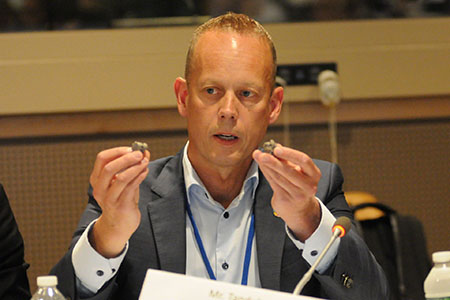
Niklas Lång, Höganäs AB, explained how using mineral-based by-products from the steel industry can purify water, removing phosphorus, copper, nickel and zinc, which can then be recycled back into the value chain.
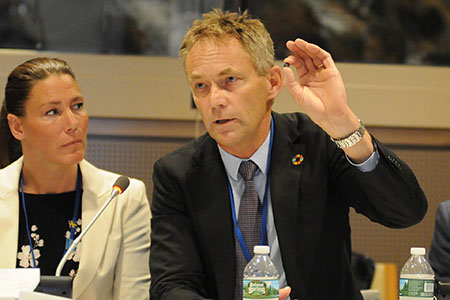
Per Bondemark, SSAB, explained how a disruptive technology using hydrogen should revolutionize the steel industry, significantly cutting its CO2 emissions and contributing to reduced acidification of oceans.
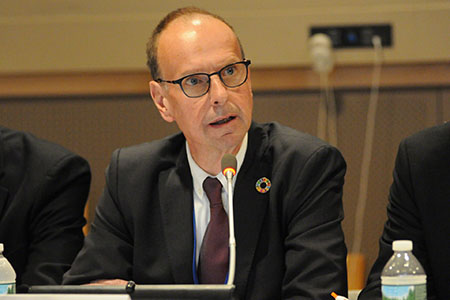
Dick Höglund, Terntank Shipping, explained his role in developing a pilot financial instrument that promotes innovation while reducing risks in investing in green infrastructure.
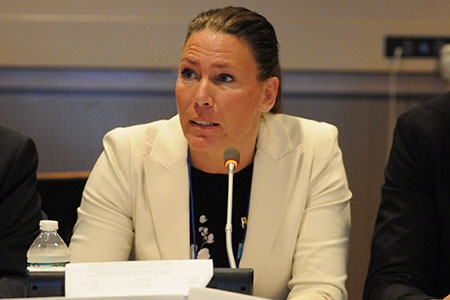
Anna Petersson, Swedish Transport Agency, said the ZVT collaborative model is now being used regionally in HELCOM.

Panel (L-R):
Mattias Landgren, Swedish Ministry for Infrastructure;
Erik Fridell, IVL Environmental Institute;
Dick Höglund, Terntank Shipping;
Edvard Molitor, Port of Gothenburg;
Tryggve Möller, Tärntank;
Anna Petersson, Swedish Transport Agency;
Per Bondemark, SSAB;
Niklas Lång, Höganäs AB; and
Tandukar Madan, Höganäs AB.
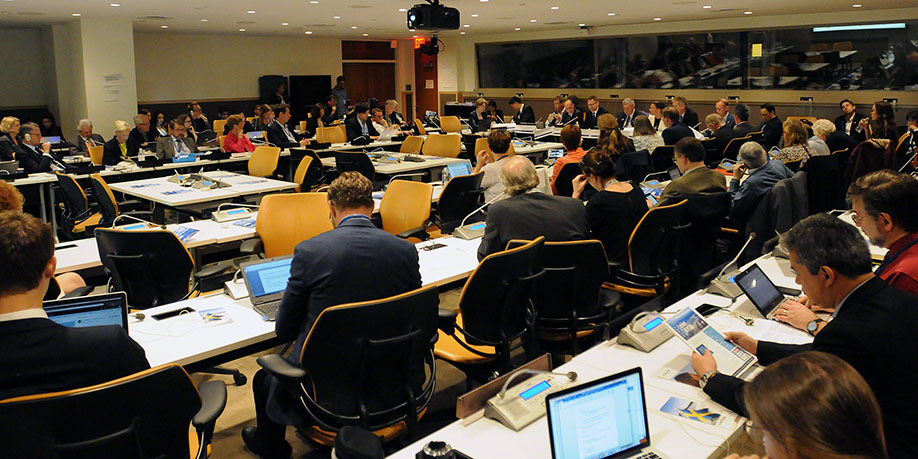
Contacts:
More Information:
Ocean's 8: One Planet, One Ocean – Celebrating Global Cooperation on Ocean Science
Presented by Intergovernmental Oceanic Commission (IOC) of UNESCO, with Sky News, UN Environment, UN General Assembly, Government of Peru and the Permanent mission of Iceland to the UN
This event, moderated by David Eades, British Broadcasting Corporation (BBC), included a presentation ceremony followed by a panel discussion.
Irina Bokova, UNESCO Director-General, set the stage for the celebration, saying that we need more global Ocean Science to achieve SDG 14 and respect the Paris Agreement. She called for 2021-2030 to become the International Decade of Ocean Science for Sustainable Development.
Eades then announced the laureates of Ocean’s 8 for Ocean Science: The Seychelles, for innovative financing; Norway, for promoting professional involvement in Ocean science; UN Environment, on behalf of thirteen countries, for developing science-based solutions to reduce plastic in the Ocean; Argentina, for sustained national investment in Ocean science; the US for promoting Ocean science for the benefit of the global community; Morocco, for promoting gender equality; Portugal, for international cooperation; and the Nippon Foundation (Japan) for education and outreach.
Panelists then focused on the key question: “Does the Ocean need more science or more action? ”
Peter Thomson, President of the UN General Assembly, spoke about the importance of science in achieving SDG 14. He underlined the strong involvement of the international community and from the business community in that struggle, drawing the parallel with the level of involvement for tackling climate change.
Karolina Skog, Minister for the Environment, Sweden, said that policy makers sometimes need to take difficult decisions, without all the required knowledge available. She stressed the need for science-policy debates and for Ocean literacy among society.
Bokova said that because the Ocean is transboundary by nature, we need international cooperation to be able to address knowledge gaps and build interdisciplinary science.
Erik Solheim, Executive Director, UNEP, cited three reasons for focusing on plastic: it is a huge problem; it has big economic consequences; and it is easy to understand so people can act.
Albert II, Prince of Monaco, spoke about the opportunity to have a decade-long focus on Ocean science to improve our knowledge on such a vast issue. He also announced the launch of a new scientific expedition by his country, covering all oceans over the next three years.
Thomas Moore, Sky Ocean Rescue, emphasized the results of media campaigns about plastic pollution, resulting in plastic bans in several countries.
Craig McLean, US National Oceanographic and Atmospheric Administration (NOAA), stressed the important work of the IOC and the contribution of many countries in Ocean science to improve Ocean management.

Ana Paula Vitorino, Minister of the Seas, Portugal, receives the Ocean’s 8 certificate for international cooperation in Ocean Science from Irina Bokova, UNESCO Director-General.
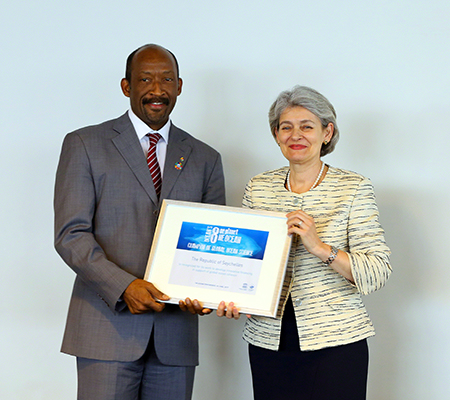
Vincent Meriton, Vice-President of Seychelles, receives the Ocean’s 8 certificate for innovative financing for Ocean science.
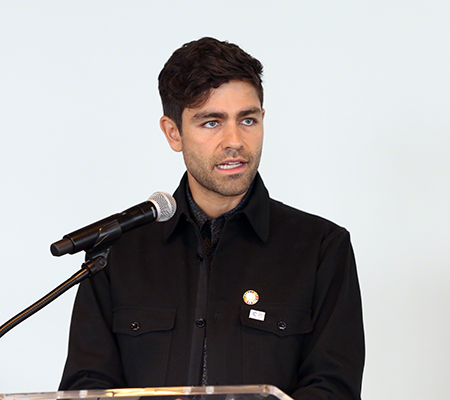
Adrian Grenier, actor, co-founder of the Lonely Whale Foundation and UN Environment Goodwill Ambassador, spoke about the importance of the UN Environment Clean Seas campaign.
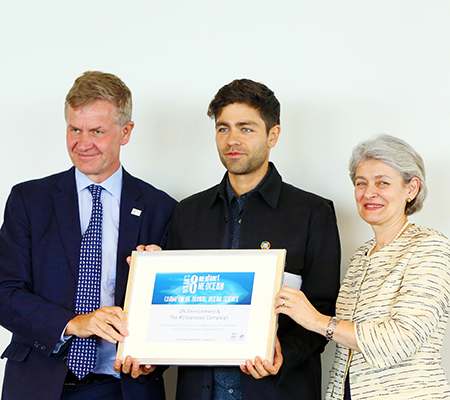
Erik Solheim, Executive Director, UN Environment (UNEP), receives the certificate for developing science-based solutions to reduce plastic in the Ocean.
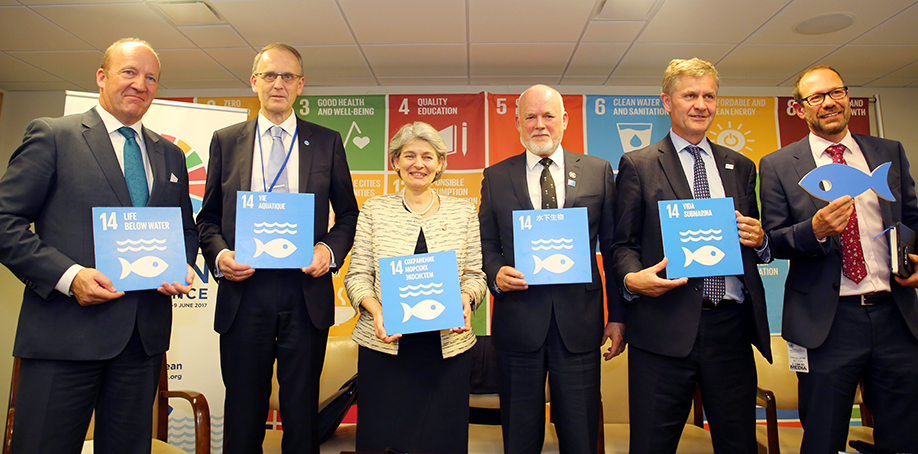
Panel (L-R):
David Eades, BBC;
Peter Haugan, President, IOC;
Irina Bokova, Director-General, UNESCO;
Peter Thomson, President, UN General Assembly;
Erik Solheim, Executive Director, UN Environment; and
Thomas Moore, Sky News and Sky Ocean Rescue Campaign.
Contacts:
More Information:
Environmentally Sound Waste Management as Action against Marine Litter
Presented by the Swedish Government Offices and the World Bank
Karin Kemper, the World Bank, said the Bank is ready to support governments and partners in achieving sustainable management of both land-based and sea-based marine litter.
Highlighting that 80% of the marine litter comes from land-based sources, Isabella Lövin, Swedish Minister for International Development Cooperation and Climate and Deputy Prime Minister, said Sweden will commit a package of contributions targeting marine litter, including: contributions to the UN Environment’s Global Programme of Action for the Protection of Marine Environment from Land-based Activites (GPA) and the UNEP Regional Seas Programme. She said the government will, for the first time, highlight sustainable oceans in its next global strategy for development, and will also scale up efforts in capacity building for sound waste management domestically and internationally.
Karolina Skog, Minister for the Environment, Sweden, stressed that “securing a circular economy is the way forward,” and highlighted the need for designing effective plastic deposit schemes. She also suggested creating a system where waste services are included in the harbor fees, without the need for special fees.
Arif Havas Oegroseno, Deputy Minister for Maritime Sovereignty in the Coordinating Ministry of Maritime Affairs of Indonesia, said Indonesia has undertaken a 15-city survey, finding that 20% of plastic leakage is going into the rivers and 80% into the Ocean. To address that, he noted Indonesia is developing domestic measures including: setting a tax on plastic bags; building 55,000 km of road from recycled plastic; and working with Nordic countries on developing waste energy projects.
Noting that Ocean plastic pollution costs US$ 13 billion a year, Lisa Emilia Svensson, UNEP, presented the “#CleanSeas” campaign, which aims to achieve a global ban on microbeads in personal care and cosmetic products, and a substantial reduction in the use and production of single-use plastics.
Linda Gårdstam, Swedish Environmental Protection Agency, stressed that if one does not have an effective waste management strategy, then the waste will inevitably become marine litter. She presented several successful Swedish domestic measures, including refunding cans and plastic bottles and empowering consumers to take action through extensive public awareness campaigns.
Anna Petersson, Chair of HELCOM Maritime, presented the HELCOM Action Plan on Marine Litter, which includes 30 regional actions (the HELCOM Collective Actions) and 27 voluntary national actions, as well as a reporting format for the implementation of actions. She explained that both regional and national actions are grouped in: land-based sources of marine litter; sea-based sources of marine litter; and education and outreach on marine litter.
In the ensuing discussion, participants raised questions related to, inter alia, the actions taken by governments to stop the production of single-use plastics, and the design of policies and programs that address the synergies between SDG 14 on oceans and SDG 6 on water.

Karolina Skog, Minister for the Environment of Sweden, said the time for questioning the use of single-use plastic products, which then stay for 450 years in the Ocean, has arrived.
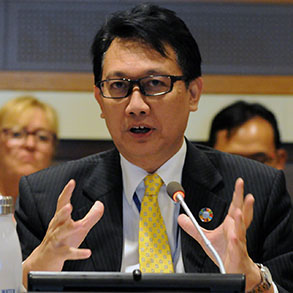
Arif Havas Oegroseno, Deputy Minister for Maritime Sovereignty in the Coordinating Ministry of Maritime Affairs of Indonesia, announced that Indonesia finalized a national plan of action on marine litter.
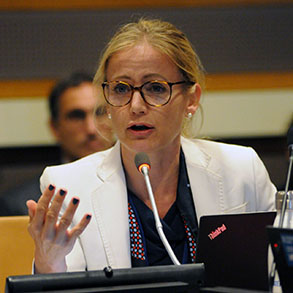
Lisa Emilia Svensson, UNEP, stressed that “plastic in the Ocean is plastic on our plates.”
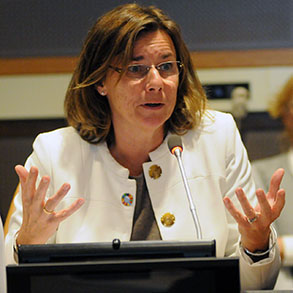
Isabella Lövin, Swedish Minister for International Development Cooperation and Climate and Deputy Prime Minister, noted that we are throwing away 13 million tons of plastic per year globally and that if the trend continues, by 2050 there will be more plastic than fish in the Ocean.
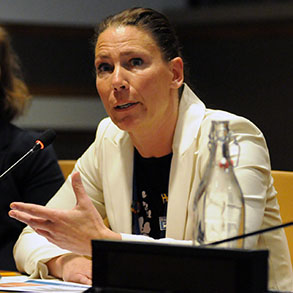
Anna Petersson, Chair of HELCOM Maritime, presented the HELCOM Action Plan on Marine Litter.

Linda Gårdstam, Swedish Environmental Protection Agency, said only 1% of domestic waste in Sweden goes to landfill thanks to highly effective waste management systems.

Panel (L-R):
Karolina Skog, Minister for the Environment, Sweden;
Isabella Lövin, Swedish Minister for International Development Cooperation and Climate and Deputy Prime Minister;
Arif Havas Oegroseno, Deputy Minister for Maritime Sovereignty in the Coordinating Ministry of Maritime Affairs of Indonesia;
Karin Kemper, the World Bank;
Lisa Emilia Svensson, UNEP;
Linda Gårdstam, Swedish Environmental Protection Agency; and
Anna Petersson, Chair of HELCOM MARITIME.
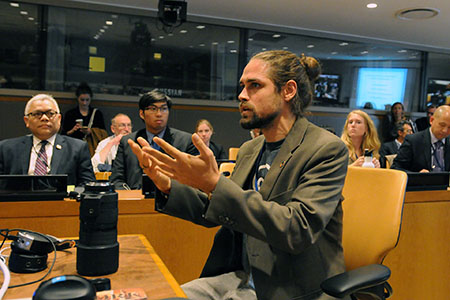
Patrick Nickisch, Oceanos, posing question to the panel.
